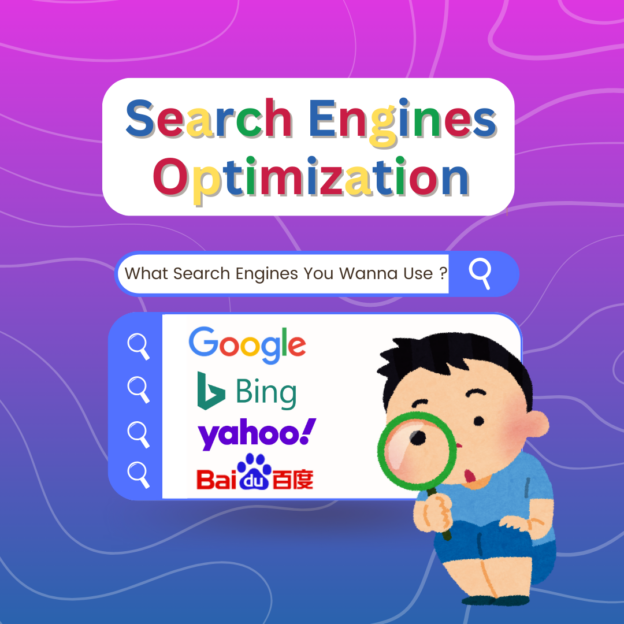How Are Search Engines Different?

What is a Search Engine?
It refers to a search program designed as a tool for searching various types of information. Most of the programs used are for searching information on websites, displaying results as websites, images, or videos based on keywords or user search terms. The results are ranked according to relevance, using various factors such as the words used in the content, the quality of the website, and the popularity of the links. Therefore, organizations that focus on website marketing need to study techniques for creating content that aligns with the workings of algorithms, such as SEO, to increase the chances of users finding their content on search engines more easily, which will help increase website traffic and conversions effectively.

The Main Different Between Search Engines
|
Search Engines |
Popularity |
Highlights |
Strength |
Weakness |
|
|
The highest | Intelligent algorithms | Accurate results, global data index | Personal information may be used for advertising. |
|
Bing |
moderate |
Beautiful display |
There is a point collection program, clear image results |
The accuracy of the results may be less than Google. |
|
Yahoo |
Gradually decreasing |
Focus on news content and substance |
Easy to use, includes news directory and other services. |
The search system is outdated compared to competitors. |
| Baidu | High popularity in China | Suitable for users in China | Comprehensive results in China |
Search outside of China is not supported. |
The benefits of Search Engines
Search engines are very useful for finding the information you need conveniently, quickly, and efficiently. They can be used at any time and provide results that match the searcher's needs.
- Quickly search for information: Users can instantly find the information or answers they need by entering search terms.
- Access to a vast amount of information: Search engines allow users to access information from around the world, covering every topic of interest.
- Increase business visibility: Businesses can use search engines to attract new customers through SEO or online advertising.
- Search for relevant and reliable information: The algorithms of Search Engines will rank results based on relevance and credibility.
- Save time: Helps reduce the time spent searching for information without having to visit multiple websites yourself.
- Specific search: You can search for images, videos, maps, news, and more according to the type of information you need.

Types of Search Engines
Search engines can be divided into three main types, differing in their operational principles as follows:
- Crawler Based Search Engine: This type of internet search engine is the most popular for use. Its principle of operation involves recording and storing data, providing highly accurate search results, and processing them quickly. The advantage is that the data is constantly updated, but this is also one of the disadvantages because sometimes some data may not be of high quality. Examples include Google, Bing, Yahoo.
- Web Directory: A website directory for information retrieval, organized and categorized into different sections.
- Meta Search Engine: A system that primarily uses Meta Tags in HTML, such as developer names, search terms, website owners, blogs, or brief descriptions. It is a Search Engine that does not store data itself but pulls information from multiple Search Engines to display results simultaneously. The advantage is that it provides diverse and comprehensive results from various sources at once.
The main search engine that people commonly use is Google because it has comprehensive information covering the entire world, with complete data that can be accessed anywhere on the globe. Additionally, it offers various supplementary services such as Google Maps, Google Images, and Google Shopping. The content is also reliable and up-to-date. Google's market share exceeds 90%.
But we will also talk about other search engines like Bing, Yahoo, and Baidu to find the differences in their usage.
Bing is a new search engine from Microsoft, launched to compete with Google. It stands out with various gimmicks. The distinctive feature of Bing compared to Google is that when searching for places, the contact number appears immediately in the first link without needing to click into the website. Another highlight of Bing is its beautiful graphics on the homepage and its tendency to provide different results from Google for certain search queries. Bing's market share is approximately 2-3%.
Yahoo is a major search engine that was once very popular but has declined in recent times due to Google taking away market share, leaving it with only 1.11%. However, Yahoo's standout feature is the integration of news services, email, and many other features all on one page. Additionally, it offers supplementary services focused primarily on news and finance content, such as Yahoo Finance and Yahoo News!
Baidu is the number one search engine in China. Chinese people prefer to use Baidu for information searches, which operates similarly to Google and offers many convenient features. Currently, Baidu is expanding its business in Thailand, focusing on software and application development. However, a major drawback is that most search queries and results are in Chinese, making it difficult for non-Chinese foreigners to access Baidu.
Currently, there are a large number of internet users worldwide, making search engines one of the main factors driving online businesses and extremely important in daily life. They are convenient to use and provide comprehensive access to content, whether it's searching for images, music, videos, translating languages, or checking the weather. Additionally, they are essential for increasing sales and profits for online retail businesses.
What Is a Meta Search Engine?
A meta search engine doesn’t crawl the web itself. Instead, it aggregates results from multiple search engines (e.g., Google, Bing, Yahoo) and displays them in a unified list. Examples include Dogpile and Startpage. These tools are ideal for those seeking broader or privacy-focused results.

Types of Search Engines
There are three main types of search engines:
- Crawler-Based: Automatically index websites using bots (e.g., Google, Bing).
- Human-Powered Directories: Organized by human editors (e.g., legacy DMOZ).
- Meta Search Engines: Fetch results from multiple sources (e.g., DuckDuckGo, Startpage).
Search Engines That Focus on Privacy
Several search engines prioritize user privacy:
- DuckDuckGo: Doesn’t track users or store personal data.
- Startpage: Uses Google’s results while masking user identity.
- Qwant: A French engine offering private, non-tracking search.

Frequently Asked Questions (FAQ)
Q: What’s the difference between a Search Engine and a Reasoning Engine?
A: A search engine retrieves content from indexed websites. A reasoning engine, like Wolfram Alpha, uses logic and computation to generate answers rather than search results.
Q: Are Meta Search Engines better?
A: They’re not necessarily “better,” but are ideal for comparing results across platforms or for enhanced privacy.
Q: Which search engine offers the most privacy?
A: DuckDuckGo and Startpage are top choices for privacy-focused users.
Understanding how search engines work—and the differences between types—helps users navigate the digital world more efficiently. Whether you’re optimizing content for SEO, protecting your privacy, or exploring reasoning-based tools, the right search technology can make all the difference.





